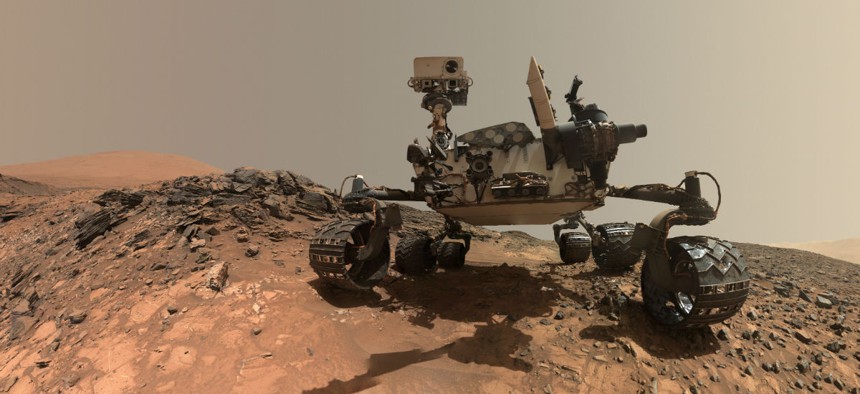
NASA's Curiosity Mars rover near a rock target on lower Mount Sharp. NASA
NASA's Latest Mars Findings Will Test Just How Interested We Really Are in Learning About Mars
Researchers address how and why the planet's once-thick atmosphere lost most of its gases to space.
After days of internet hype, NASA’s major Mars announcement is here.
Using data collected by the MAVEN space probe orbiting Mars, NASA researchers detailed a number of findings about the Red Planet’s atmosphere that address how and why the once-thick atmosphere lost most of its gases to space. One discovery suggests that massive sunbursts—called coronal mass ejections—were largely responsible for Mars losing its atmosphere a very long time ago. Another reconfirms the scientific consensus that the Martian atmosphere must have once been able to retain water. The findings were published on Nov. 5 in four separate studies in the journal Science.
If you were hoping for much more than that, you’re probably feeling a little disappointed.
To be clear, these findings are important. Any information gleaned about Mars, its climate, and whether or not it was once or may currently habitable, is information worth sharing. But how many news publications would have covered these papers had NASA not sent out cryptic messages beforehand, promising revelations about the Red Planet?
A post on the r/Space page on Reddit—which made it to the front page of the site hours before the 2pm EST announcement—was filled with theories about what NASA was about to unveil. Methane gas in the atmosphere produced by living organisms? Giant bodies of water? Aliens?! A cursory Twitter search for “NASA Mars” shows a similar sense of urgency.
One need look no further than the myriad headlines this week hyping the announcement: “NASA to deliver big news on Mars’ atmosphere Thursday,” on CNN, “There’s a slim chance that NASA’s next big announcement concerns life on Mars,” on Business Insider Australia (it didn’t).
By providing small bits of information before the actual announcement, NASA seems to be riding the coattails of its last major Mars announcement—the one that revealed the first-ever evidence that liquid water may still flow on the planet. But the space agency can’t help but feed into internet hype a bit. NASA literally has a mandate—detailed in the 1958 Space Act—to inform as many people as possible about its activities, and space research has found a particularly shareable niche on social media.
If you ask most scientists or science writers, that’s a good thing. It shows that scientific developments are becoming a part of the public consciousness. Our environment—and the ultimate fate of the planet—depends on ordinary people being informed about and supportive of scientific endeavors. As does NASA’s funding, so that it can continue serving its mandate.
So, NASA, keep the announcements coming. Hype them up as much as you want. But for everyone else: Temper your expectations. Not every finding will be revelatory; not every research paper mindblowing. That doesn’t mean they aren’t important.






